Updated: July 12, 2023
When answering the question, “What do ferrets eat?” it’s important to start by looking at their nutritional classification. Ferrets fall into a category called obligate carnivores, sometimes referred to as “hypercarnivores.” This group of animals requires very high levels of protein in the diet and consumes almost exclusively animal matter in the wild.
Other carnivores, such as foxes, can consume and utilize a greater level of plant material and generally require less overall protein in the diet. Because their natural wild diet does not require the digestion of much plant material, ferret’s gastrointestinal anatomy and physiology are completely lacking some of the components and processes need to utilize plant-based nutrients in the diet.
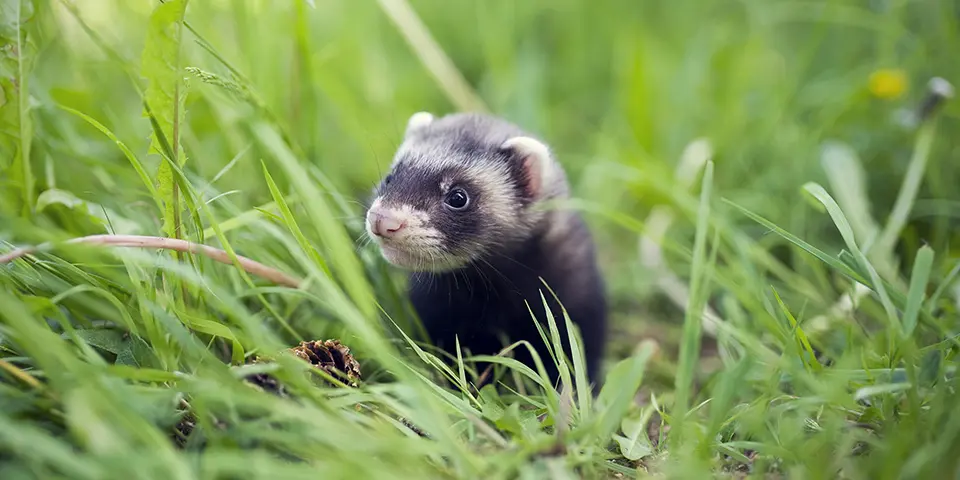
What Do Ferrets Eat in the Wild?
In the wild, ferrets largely consume small mammals such as rabbits, mice, rats, and other rodents. However, they are very opportunistic hunters and will also eat other species such as fish, birds, reptiles, and sometimes even insects.
Ferrets have been documented eating carrion (dead animals) on occasion but prefer to catch and consume live prey and are equipped with a great sense of hearing and scent, a strong bite, and short powerful legs which make them capable hunters.
Typically, the only plant-material that ferrets consume comes from the gut contents of their prey. Research into their natural feeding habits indicate that ferrets require a diet that is:
- High in protein (>35-40%)
- High in fat (≥20%)
- Low in fiber (<5%) and carbohydrates
The natural diet of wild ferrets should be used as a reference point for how to best feed these species in captivity.
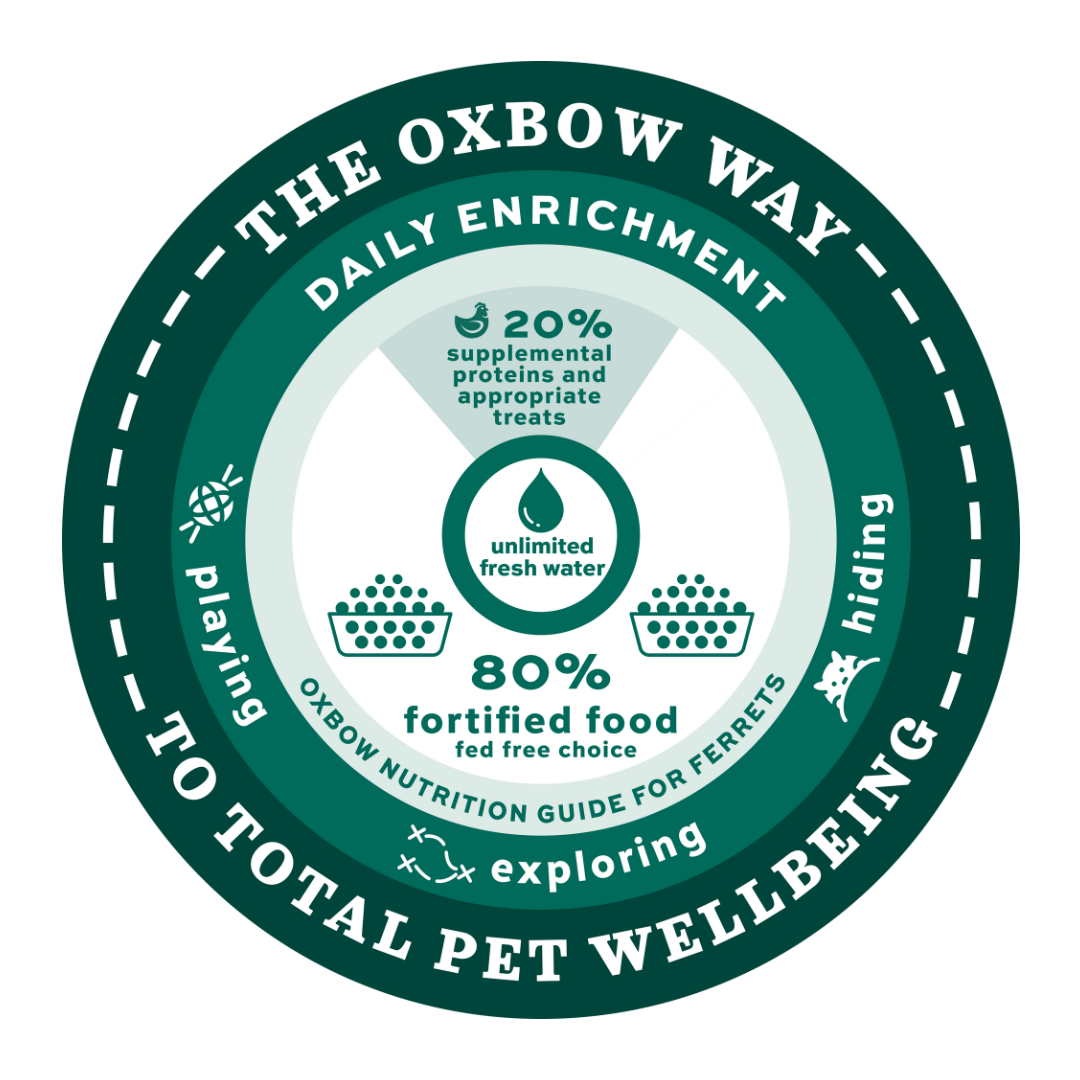
What Should My Pet Ferret Eat?
Using a wild diet as a template for your pet ferret’s nutritional needs is a great starting place. Though domestication can change some characteristics, the nutrient requirements of a pet ferret closely mimic that of a wild animal.
- The natural diet and prey items of a ferret tell you that they do not need many plant-based ingredients and furthermore, cannot digest and utilize them.
- When equating this to what to look for in a bag of commercially available ferret food, a good rule of thumb is that the first five ingredients should be animal-based.
- High starch and plant-based protein ingredients like corn, potatoes, and peas as well as any fruits and vegetables should be absent from the ingredient list entirely as they aren’t optimal for your hypercarnivore’s digestive health and could predispose them to disease or illness.
- Looking at the guaranteed analysis on a bag of ferret food, nutrient concentrations should mimic those of ferret’s natural prey items so look for a minimum of 35% protein (>40% is best), at least 20% fat, and a fiber concentration less than 5%.
Can Ferrets Eat Cat Food?
It is not uncommon for people to still recommend ferrets be fed cat and/or kitten food. Though cats are also hypercarnivores and do require high levels of protein and fat, many domestic cat foods still utilize a lot of plant-based ingredients such as corn which should always been avoided in ferret foods.
Furthermore, even many high-quality kitten foods may not contain adequate levels of protein and fats that ferrets require. Thus, it is always best to utilize a species-specific ferret food to ensure you are meeting the macro and micronutrient needs of your little one.
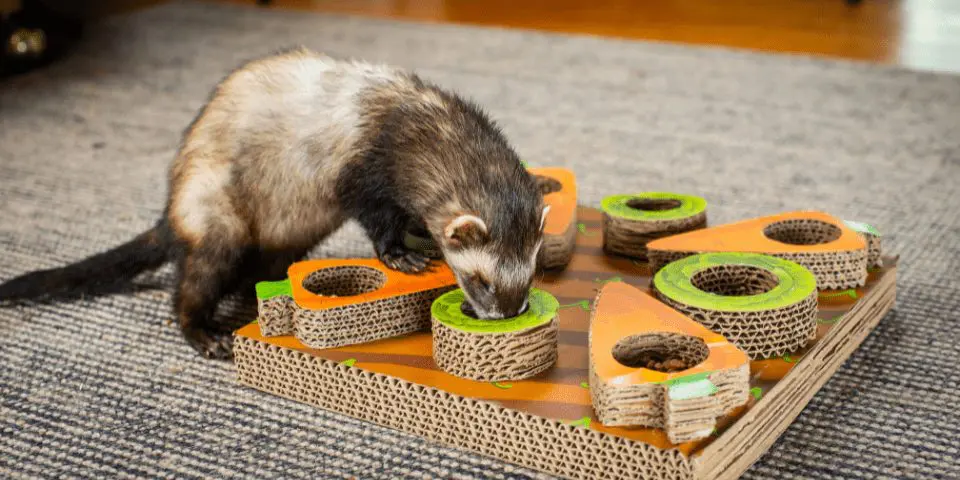
How to Transition Your Ferret’s Diet
Transitioning your ferret from one diet to another can sometimes pose a unique challenge. While some ferrets willingly transition between foods in a couple of weeks, some are more reluctant and require a more gradual transition over six to eight weeks or longer. This often stems from what is referred to as “nutritional imprinting” where young ferrets develop an affinity to the taste and structure of the food they were first raised on and become reluctant to try anything else.
Palatability of lower quality foods containing high starch levels may also play a role in uneager transitions as you attempt to upgrade your ferret’s diet. No matter the reason, transitioning your ferret to a higher quality food (low starch, high protein, high fat) is one of the most important decisions any ferret owner can make and can help avoid serious health problems in the future.
If your ferret doesn’t easily transition foods, don’t lose hope. You can try the following to help encourage them to transition:
- Slow transition: replace only 5-10% of their current diet with the new diet weekly
- Add water to a mix of the current and new kibble
- Utilize Oxbow’s Carnivore Care
- Add some with water and the new food to make a gruel or soup for them
- Top dress with dry or reconstituted product
- Hand-feed some of the new kibble if your ferret responds well to direct interaction
- Top kibble with a small amount of a high quality/preferred fat or oil (like salmon oil)
Supplemental Nutrition
Many complete, balanced and fortified ferret foods are offered free choice (always available) as ferrets tend to self-regulate dietary intake. Your ferret’s food should make up about 80% of his overall diet. Ferret-appropriate supplemental foods and treats can make up the other 20% of a ferret’s diet to provide training or bonding opportunities, variety, or just extra protein and fat.
Good Options Include:
Supplemental nutrition should consist of high-quality, animal-based proteins, and fats and can come in the form of homemade morsels such as boiled or cooked muscle meats such as:
- Chicken
- Cooked eggs
- Dehydrated organ meats.
- If appropriate in the household and properly handled/stored, raw or dehydrated diets, raw meat, and whole prey (mice and rats) can also provide supplemental nutrition and enrichment for ferrets.
Avoid Offering:
Dietary items like fruits, vegetables, cereals, and grains should be avoided.
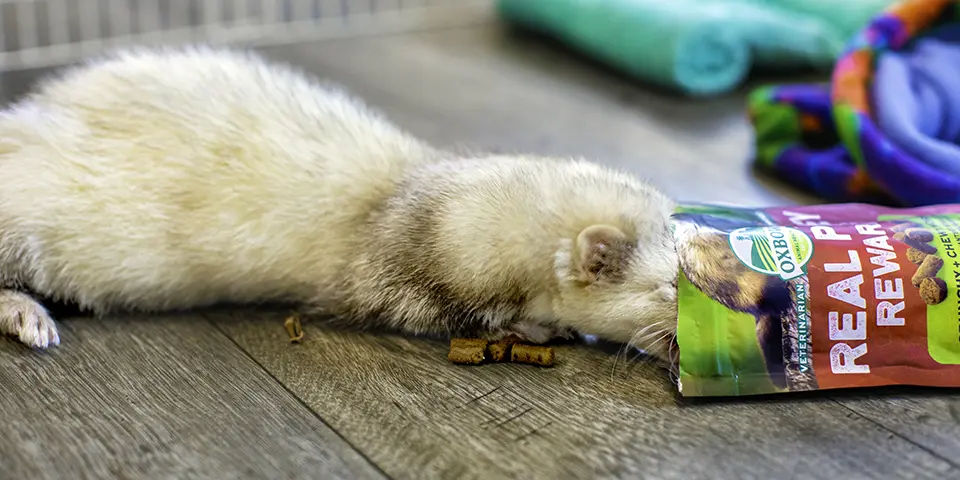
What to Look for in Commercial Ferret Treats
Commercially available treats are another option and, like the diet, should avoid plant-based ingredients like fruits and vegetables.
- Manufactured treats should also focus on providing animal-based proteins and fats while limiting carbohydrates and artificial colors, flavors, and preservatives are never necessary.
- Freeze-dried animal proteins provide a good treat option if they are palatable to your animal.
- You can also work with your veterinarian to acquire Oxbow’s Critical Care Carnivore to offer as a treat and supplemental protein and fat in this format.

Don’t Forget About Enrichment!
Providing the right daily nutrition for your ferret is essential to his health and happiness. However, it’s important to remember that there’s more to ferret wellbeing than nutrition alone. The benefits of daily enrichment include both mental and physical health. If you’re interested in learning more about enriching your ferret’s world, we’ve created this article to help.
Ferret Life Stages
Diet and nutrient requirements can be impacted by a ferret’s life stage.
- Ferrets are generally considered to be adults at seven months and prior to that are often referred to as kits.
- While highly dependent on the animal as well as history and husbandry, ferrets older than 5 years are often considered geriatric or senior.
- The typical captive lifespan of ferrets is in the 7-to-8-year range.
Most commercially available ferret foods are formulated to meet nutrient requirements at all life stages from kits to seniors; however, supplemental foods can be adjusted in early and late-life to accommodate specific health needs.
You should always consult with your veterinarian to assess the needs of your individual animal, but young and growing ferrets may benefit from more supplemental proteins and fats to meet nutrient and energy needs for growth. Older ferrets may suffer from gastrointestinal and renal disease or can alternatively lose muscle mass so working with your veterinarian will ensure the correct dietary adjustments, if any, are made.
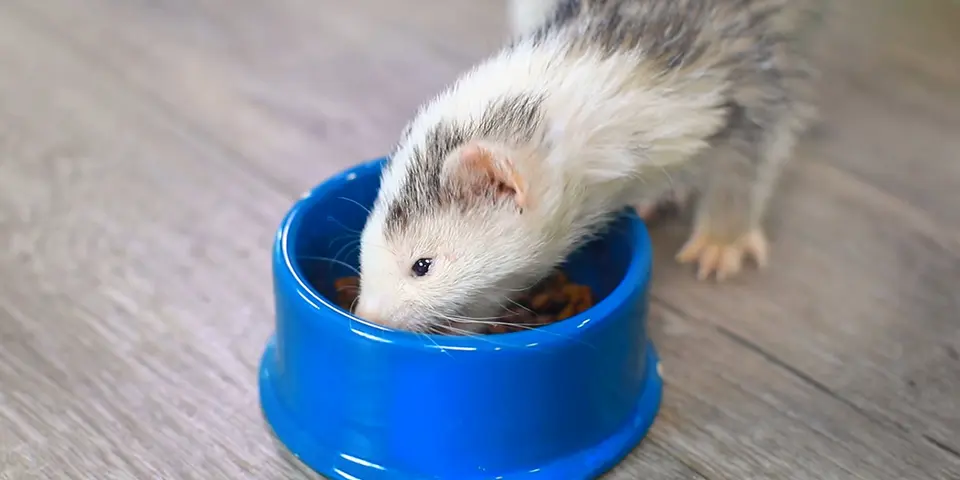
Ferret Nutrition In Review
Ferrets are obligate carnivores that consume very little plant matter in the wild. In turn, their domestic counterparts are not equipped to digest and utilize carbohydrates and plant-based ingredients. Thus, domestic ferret diets should be high in protein (>35-40%) and fat (≥20%) and low in carbohydrates and fiber (<5%).
Transitioning ferrets from one food to another may be cumbersome for some animals, but the potential health benefits of a higher quality diet far outweigh the difficulties sometimes experienced. Additionally, supplemental animal-based proteins and fats are a great way to add variety to your pet’s diet, supply extra protein and fat, or just provide bonding or training time.
As your ferret grows and ages, some nutritional requirements may change. However, these potential changes to requirements are not universal and depend on your individual animal’s genetics, diet, husbandry and so much more. So, it is always best to have regularly scheduled health checks with your veterinarian to assess your pet’s needs to keep them happy and healthy.
